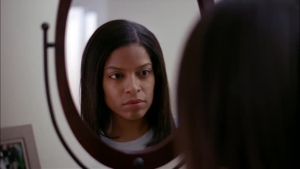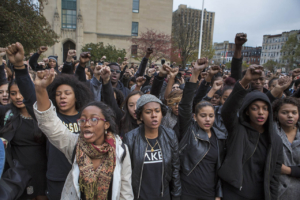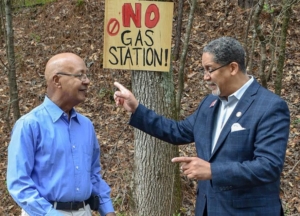The Reluctant Activist
 I rifled through the plastic container, searching for the perfect nail to affix my handmade sign to the tree. Renee, my partner in crime, stood to my right holding the “NO Gas Station!” signs that we’d just made in my garage. She seemed unconcerned about the vehicles that whizzed by a few feet from us, but I noticed the drivers who stared at us quizzically as they paused at an adjacent stop sign. We must’ve been a curious sight, the two of us, traipsing around that wooded lot in sweatpants and sneakers. She, the retired social worker and seasoned community organizer. Me, the former executive and reluctant activist, wondering just how I’d ended up here.
I rifled through the plastic container, searching for the perfect nail to affix my handmade sign to the tree. Renee, my partner in crime, stood to my right holding the “NO Gas Station!” signs that we’d just made in my garage. She seemed unconcerned about the vehicles that whizzed by a few feet from us, but I noticed the drivers who stared at us quizzically as they paused at an adjacent stop sign. We must’ve been a curious sight, the two of us, traipsing around that wooded lot in sweatpants and sneakers. She, the retired social worker and seasoned community organizer. Me, the former executive and reluctant activist, wondering just how I’d ended up here.
* * *
This isn’t the story of a girl who undergoes an emotionally linear transformation from working for the establishment to leading protest marches. It would be simpler if I told it that way. It just wouldn’t be true. And that’s not usually how it happens anyway, is it? While most good stories have an inflection point that sets the protagonist off in some new direction, real life isn’t so black-and-white. We often evolve in fits and starts, over micro millennia, not fully aware of the changes we’re experiencing on a molecular level. And when we are, sometimes yielding, sometimes resisting.
 If we’re lucky, when we catch a glimpse of our transformed selves—perhaps, like me, in the reflection of a passing car window—we’ll recognize the new creature we’ve become and embrace her. It’s when we don’t, or won’t, that we can experience identity crisis. According to the clinical definition, identity crises are reserved for adolescents, but I don’t agree with that. I think it’s when your internal identity no longer matches your external reality, and it happens to adults all the time. I’ve witnessed this phenomenon among friends who had to shed their former identities of successful professionals to take on the thankless—and financially perilous—role of caregiver to an ailing parent. The men who lost their status as breadwinners during The Great Recession likely had a similar experience. In retrospect, I’ve had identity crises at multiple stages in my life.
If we’re lucky, when we catch a glimpse of our transformed selves—perhaps, like me, in the reflection of a passing car window—we’ll recognize the new creature we’ve become and embrace her. It’s when we don’t, or won’t, that we can experience identity crisis. According to the clinical definition, identity crises are reserved for adolescents, but I don’t agree with that. I think it’s when your internal identity no longer matches your external reality, and it happens to adults all the time. I’ve witnessed this phenomenon among friends who had to shed their former identities of successful professionals to take on the thankless—and financially perilous—role of caregiver to an ailing parent. The men who lost their status as breadwinners during The Great Recession likely had a similar experience. In retrospect, I’ve had identity crises at multiple stages in my life.
As far as I know, we’re the only species that experiences such neuroses. We think that possessing that level of consciousness makes us superior. But do you know that bugs don’t have identity crises? They are born knowing that they’re not yet what they will be, but also exactly what they will become, so they don’t get attached to identities that will one day no longer fit them. I think that makes them superior.
…the Universe has a will of its own that bends and shapes us in spite of—or perhaps because of—our ambitions.
As for humans, we consider it an act of love and encouragement to tell our offspring that they can become whatever they wish, choose your own adventure. Schools still have Career Days where children are encouraged to pick a label that they will carry with them for the rest of their lives. But we don’t usually tell the rest of the story: that the Universe has a will of its own that bends and shapes us in spite of—or perhaps because of—our ambitions. When that sculpting process reaches its conclusion, we must come to terms with the outcome, whatever it may be.
* * *
If you’d met me in high school, you might have predicted that one day I’d be making protest signs in my garage and pissing off the powers that be. But life doesn’t always unfold in the way we expect.
Freshman year had barely started when my troublemaking gene fully expressed itself. I grew up in Pittsburgh where air conditioning was a rare find, and when classes began in the late summer of 1989, it was stifling hot. As if the lack of AC wasn’t bad enough, some sadistic bureaucrat had decided that we weren’t allowed to wear shorts to school. We were miserable and complained openly about this undeserved oppression. So I circulated a petition demanding that the school change its policy and allow us to wear shorts. I don’t remember how many signatures I collected, but it was enough that I felt confident presenting them to our harried principal, and in what seemed like record time, our demands were met! We could wear shorts, the authoritarians decreed, but not more than one inch above our knees, or we risked being sent home. We reveled in this small victory even though school administrators refused to give us credit for it, lest we allow our newfound power to go to our heads. I parlayed that win into formal leadership roles at school and honed my reputation as someone who wasn’t afraid to speak truth to power.
At home, my parents were sticking it to The Man in their own right. After my father had run unsuccessfully for school board, he and my mother organized with other parents to sue the Pittsburgh Public Schools for discriminating against black students. Through years of persistence and a lot of data, they succeeded in having the school system placed under a consent decree to correct its racist disciplinary practices.

Boston University students marching on campus. (Jesse Costa/WBUR)
With my whole family’s community organizing bona fides firmly established, I departed for college. As it is on many college campuses, protest was a relatively common occurrence at my historically black university. I marched on at least three different occasions during my undergraduate years. Except for one, I don’t even remember why. I assume I believed in the causes I marched for, but I was likely also influenced by the energy of the moment and by the fact that I was a columnist and an editor for my college newspaper—so it made for great material.
* * *
At some point between protesting on campus and taking a job with a public/private partnership, I had made a choice: to try and change the system from within. I don’t remember it being a conscious decision, but it is a common rationalization. I made this decision without irony and resolved to be a champion for representation, excellence, integrity, and efficiency. Regardless of the story I told myself, however, I couldn’t deny that I was no longer anybody’s activist.
Regardless of the story I told myself, I couldn’t deny that I was no longer anybody’s activist.
As I wrestled with this internal conflict, I colored outside the lines by challenging the status quo and occasionally pissing off a superior. In fact, I may have been the most outspoken and nonconformist senior manager many of my colleagues had worked with. At the time, I cast it as part of my change agent identity, but I think it was also a way to reassure myself that I had not completely abandoned my activist principles.

Had I become a #slacktivist?
Once I transitioned from local government to entrepreneurship in 2013, I struggled to find my place. In more ways than one, I was questioning who I was and where I belonged. I became a hashtag activist, signing Change.org petitions and reposting #BlackLivesMatter memes, but I clung to my identity as an insider. I suppose I was attempting to hold on to the respectability (and income) that comes with working inside the system. Besides, I rationalized, not everyone could effectively manage large, complex institutions, so wouldn’t my talents be put to better use there?
* * *
It was in late 2016 that I found myself at my first Black Lives Matter event. The specific atrocity that prompted me to attend, I don’t recall, but I do remember that my soul was tired. The names and faces of black people murdered by police tormented me. The occasion was billed as a self-care event, a safe space for us to come together and heal from the violence and neglect directed toward the black community. My spirit wanted and needed to be there, but my conscience berated me: These people are tired because they’ve been doing the work, it screamed. What have you been doing? Go home! I shifted in the pew and looked around at the faces in the small church where we’d gathered. I winced at the thought that the young white activists sitting next to me had more of a right to be there than I did. After chatting with them for a few minutes, I trudged to a workshop that started off with some deep breathing exercises. Then we went around the room sharing what had brought us there that day. I made a self-conscious confession about my inadequate involvement in the community. It seemed even more pitiful once a young woman shared tearfully about her boyfriend, a veteran, who had been killed by a police officer while naked, unarmed, and in mental distress.
 That event became a turning point for me, and I joined some grassroots groups in my community. I even became the president of one. Still, I strongly favored roles that depended on my professional skills: strategic planning, writing policy statements and press releases, running meetings, and moderating panels. Until a need arose that compelled me to step outside of my comfort zone. I and many residents were dismayed by what we perceived to be our city administration ignoring the will of the community and violating commonly accepted ethics. In my professional role, I had addressed elected officials at public meetings more times than I could count. I had even been verbally attacked and disparaged and didn’t back down or lose my cool because that was the job. But when I stepped to the podium as a citizen, I stumbled over my handwritten notes as if it were my first time. My message still found its mark, but a realization weighed on me: I had just come out as an activist. There was no going back now.
That event became a turning point for me, and I joined some grassroots groups in my community. I even became the president of one. Still, I strongly favored roles that depended on my professional skills: strategic planning, writing policy statements and press releases, running meetings, and moderating panels. Until a need arose that compelled me to step outside of my comfort zone. I and many residents were dismayed by what we perceived to be our city administration ignoring the will of the community and violating commonly accepted ethics. In my professional role, I had addressed elected officials at public meetings more times than I could count. I had even been verbally attacked and disparaged and didn’t back down or lose my cool because that was the job. But when I stepped to the podium as a citizen, I stumbled over my handwritten notes as if it were my first time. My message still found its mark, but a realization weighed on me: I had just come out as an activist. There was no going back now.

City Councilman and Mayor announcing their opposition to the convenience store–in front of my sign!
So earlier this year, when my neighbors and I learned of an unwanted development in the works during a town hall meeting, I sprang into action. An out-of-state developer wanted to put in a gas station and convenience store on an improperly zoned lot smack in the middle of our heavily residential neighborhood. The community had fought them off once before, but now they were back and receiving the covert assistance of our city officials to complete the project. The thought of underground fuel tanks threatening a nearby stream, tankers barreling down our already-neglected neighborhood streets and a busy establishment on a treacherous stretch of road was too much for us to bear. I scribbled out a petition and circulated it around the meeting room to my angry neighbors. Renee and I joined forces, and in short order there was a small coordinating committee, flyers, a huge turnout at the next City Council meeting, and, of course, the signs.
In a stunning about-face, the mayor announced that the city would no longer support the convenience store project and would instead purchase the land from the developer and turn it into a neighborhood park. This was less than two weeks after we organized our opposition. I guess even a reluctant activist can be effective.
* * *
Once Renee and I had finished hanging up the last sign, we waited for oncoming cars to pass so we could cross the road. It was then that I caught a glimpse of myself in the window of a passing SUV and felt the familiar sting of self-consciousness. Was this how I wanted to advocate for change? As a community organizer in sweatpants rather than a policymaker in a business suit?
In all honesty, my answer is still “No.” Even after a major community organizing victory, I have to admit that I am much more comfortable in a boardroom than I am at a protest. I realize that my sculpting process is not yet complete, and I do not know who I will be when it is. What I do know is that whoever I become, I want to embrace her without shame or insecurity. For now, activism is the assignment the Universe has given me, so that is how I will serve. I’m still working on the reluctant part.
 A.D. Lowman is a management professional, consultant, and community leader. Her leadership and career advice has been featured in Essence, Money, and Diversity Woman magazines. She is pursuing her MFA in Creative Writing at Antioch University Los Angeles where she serves as a blogger, interviewer, and assistant web team manager for Lunch Ticket.
A.D. Lowman is a management professional, consultant, and community leader. Her leadership and career advice has been featured in Essence, Money, and Diversity Woman magazines. She is pursuing her MFA in Creative Writing at Antioch University Los Angeles where she serves as a blogger, interviewer, and assistant web team manager for Lunch Ticket.





